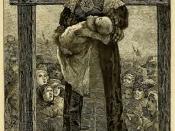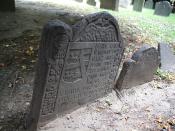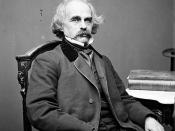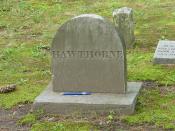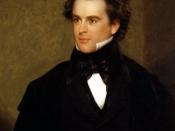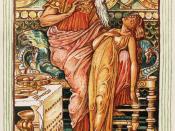The quintessence of classic American literature is Nathaniel Hawthorne. The quintessences of Nathaniel Hawthorne's classics are his anti-transcendentalist views. However, there is a subtler view of this author, especially portrayed in The Scarlet Letter, which is also characterized. This is his portrayal of women and femininity. He portrays women as essential, good contributors to society, and a wonderful being.
Hawthorne has always presented the few good women of his books as beautiful and tall. Hester Prynne is an example of this. "The young woman was tall, with a figure of perfect elegance on a large scale being beautiful from regularity of feature and richness of complexion (Pg 51)." Hester is always directly portrayed in a positive way, none of her negatives are ever written in the book. However, not all women of the novel are presented this way. Many of the women beneath the scaffold where Hester first stood upon were portrayed as ugly, old and harsh; but this is only because Hawthorne wanted to characterize his characters based upon their gentility.
Hawthorne does this to men also - the men beneath the scaffold were also portrayed as ugly and harsh. Hawthorne never wrote about male gentility, or the wonders of being in manhood - he only wrote about female gentility and its wonders.
In the days of the novel, women were supposedly good for only bearing children, and taking care of the family. It was very uncommon and frowned upon for women to do anything else. Hawthorne's novels had women more than just care-takers of the family. In the case of Hester, she was a great contributor to her society. She was very charitable, giving away many of her fine embroidery. She was not a delicate female who obeyed all men, as women were expected to do in those days. She was a true individual with her own goals, being independent of everybody else. She was scorned and disgraced by her society. Unlike men and other women of the time, she accepted this and did not fear the insults coming from anybody who sees her. Her acceptance was also part of the wonders of women that Hawthorne presented in this novel. Dimmesdale, a man, did not have the courage to accept the adultery he committed. Dimmesdale was Hawthorne's most positively portrayed man in the novel, but Dimmesdale's courage, acceptance, gentility, and independence doesn't come close to Hester's. Once Dimmesdale confessed to his crowd, Dimmesdale died. He did not have the courage to accept his society and what he did, unlike Hester, who pressed on even though there is nothing to hope for anymore.
Finally, Hawthorne presents Hester in the novel as a caring human being. Hawthorne has viewed feminine gentility as the best qualities of life, Hester being one of his examples. "She was ladylike, too, after the manner of feminine gentility of those days; characterized by a certain state and dignity (pg 51)." Hester was gentle to all men and women - including the ones that scorned her. She presented her wonderful embroideries as charities to the poor, even though the poor jeer her. Hawthorne also characterized Hester by her needlework. She is very skilled at the needle, which is another good quality that Hawthorne gave her. Hester also cares the most about her little Pearl. She lives just for Pearl, giving her the care any parent should give and more. Pearl is the living embodiment of Hester's sin, but Hester has accepted this and has done what a parent should do. Hester named her daughter "Pearl" because she bought Pearl with everything she had - including her dignity. Hester sold her normal life away to acquire her little Pearl.
In conclusion, it can be stated that to Nathaniel Hawthorne presented women as more gentile, more persisting, and more essential than men. Hawthorne felt women to be more sacrificing and caring than the men. He felt womanhood is one of the greatest things of life. Hawthorne also describes women as possessing more will to live, and having more passive courage than men. He indirectly illustrates, using his novels, that without the charitable, courageous, persisting, and gentile women society would cease to exist.
